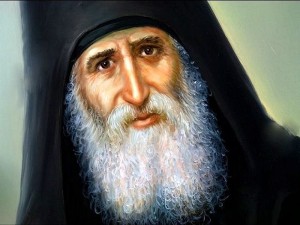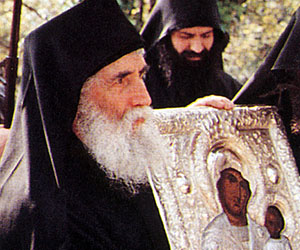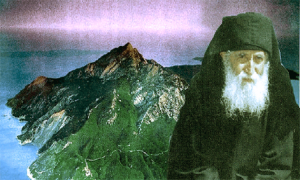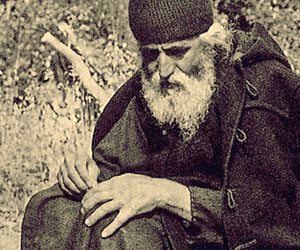ELDER PAÏSSIOS: an air of saintliness
14 March 2017FROM MY ACQUAINTANCESHIP WITH THE BLESSED ELDER PAÏSSIOS
‘Only saints can talk about the saints as they share common spiritual experiences and understand each other’, the blessed Elder Païssios once said to me. And as I fail to fulfil this essential condition, which would have enabled me to fathom the depths of his great spirituality, all I can do is dwell on certain external events in his life which he had the infinite goodness and grace to tell me about so that I might perhaps mend my ways. Even so, these events clearly illustrate the man’s great saintliness.
A few days before he departed this life, while still on his sickbed suffering from a painful illness, he had said: ‘These last few days in hospital I’ve had my fill, so to speak, of octopus and squid. Now I’ve got my own back on them as they never managed to eat me themselves’. He went on to explain what he meant. When his compatriots from Farasa were forced to leave their blessed Cappadocian village as refugees, together with their saintly pastor Hadji-Efendí – the later St. Arsenios of Cappadocia – they found themselves crammed together on a passenger boat bound for their motherland, Greece. Everyone on the deck, mentally and physically worn out by their recent ordeal, secretly hoped that they would be able to live free lives once they arrived in the beloved motherland… With them was the Elder’s mother, the late departed Kyra Evlambia, the wife of Farasa’s mayor, with her very young and newly baptised baby boy Arsenios wrapped in his swaddling-clothes. As she struggled through the dense mass of people, a little old woman stumbled and trod on the baby, her foot crushing into its belly. The baby squealed with pain and then stopped moving, apparently lifeless. The mother, believing that her child was dead and fearing that the sailors might throw its body overboard, as they do with all who die at sea, in accordance with international maritime regulations, concealed it beneath her long dress for nine hours, until they reached Piraeus, so that she could give it a proper church burial. As soon as they had disembarked, the seemingly dead infant suddenly started crying. By God’s grace, it had come back to life so that years later, in our own time, it could give life to countless numbers of dead souls and support them in their journey through life with his wise and saintly advice and fervent prayers.
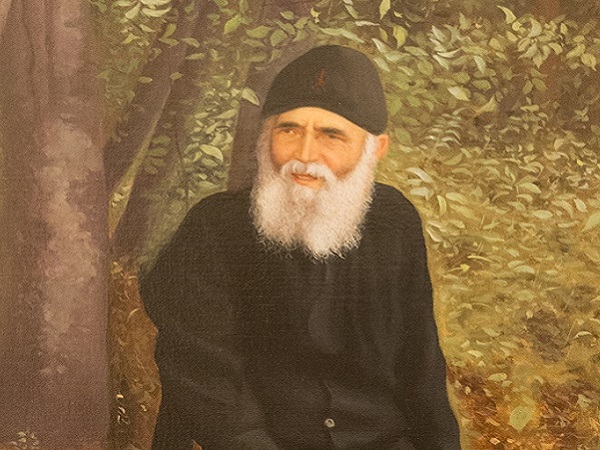
‘Great men derive their greatness from a distant source.’ This patristic saying is true and totally appropriate in the case of the saintly Elder Païssios. From an early age, in Konitsa where he grew up, he showed signs of this divine influence in the holy life that he led. Like another man destined from childhood to become an elder, his compatriot St. Sabas the Sanctified, he would chide his simple fellow villagers for nicknaming him ‘the monk’ after realising or suspecting the nature of his secret life. ‘But this helped me,’ Elder Païssios would say, ‘I always used to think “since everybody calls me a monk, what am I doing in the world? I should be in a monastery.”’ Yet even before he began his monastic struggles, the blessed Elder committed many acts of ‘spiritual foolishness’ out of his enormous love for God. As a child, he may not have grasped the full significance of many things yet he did them as if God had taught him how to do them, since from an early age he began to have the visions of saints that were such a frequent occurrence in his wondrous life. He was spurred on by the fervent prayer and desire of the priest who had baptised him, his namesake Father Arsenios, for a spiritual heir. Father Arsenios bestowed his paternal blessings upon him. One saint blessing another… And he sent him to the Garden of the Virgin Mary1, where he made good progress and helped many believers experience something of the sweetness of the holy life. When the marvellous Life of the saintly Cappadocian priest was written and published, the boy the priest had baptised – ‘an honourable child of an affectionate spiritual father’ – discharged his spiritual debt to the full. It was as if the two saints vied with each other to see who could show the most gratitude and philotimo2 in their relationship with God.
It is difficult to describe what we ourselves saw and heard and, by God’s great goodness, experienced in the company of this saintly man and great Athonite ascetic. His name has now become a legend and his splendid life will shine like a radiant star in the firmament of our Church, while his tomb at the Holy Convent of the Evangelist John the Theologian in Souroti will, as a result of his supplications, become a source of many miracles and answers to prayer – answers to problems laid by pilgrims with heavy hearts but fervent faith at the foot of the simple wooden cross that marks his grave. We believe that very soon we may be fortunate enough to see him become officially recognised as a saint by our Church…
‘You can tell the lion by its claws.’ I confess that for many reasons I will not be able to recount here the most important experiences that I had in my long acquaintanceship with the Elder. Although now after his death he doesn’t need anyone to sing his praises, and runs no risk of being affected by any poor human accounts of him, people connected with the things that happened are still alive and it is not wise to put any of our innocent brothers in a difficult position. For this reason I will confine myself to relating just a few but nonetheless characteristic events.
‘Let me tell you something, my blessed soul. Let’s say I see two hundred heavenly visions and apparitions; of these, I will reject one hundred and ninety-nine and keep only one. Do you know what a dangerous thing it is to be concerned with visions and revelations? Our good Father in Heaven will not blame us for adopting this attitude; on the contrary, He will praise us for it since by doing this we show spiritual wisdom.’
‘I reckon the world’s gone mad. They say only me and Father Ephraim of Katounakia are saints. Father Ephraim, I agree, is a saint, but as for me, they don’t know what a worthless piece of rubbish I am… God have mercy on me. Do you know what, my blessed soul? There are fifty great saints alive on Mount Athos today but they’re clever, not like me, the silly old fool; people began saying things about me and blow me if I can stop the rumours from spreading… I mean they beseech the Heavenly Father not to show them His glory in this life, but to keep it for the next world. And our loving Father hears His honourable children and does what they ask. But do you know what? We over here on the east side, because of the dampness, which is no good for cultivating saintliness, have only got fourteen saints, while on the other side, the west, where it is sunnier, they have got more than us – thirty-six in all!’
After Great Lent I paid him a visit. ‘Good to see you, my blessed soul! How did you get on out there? How did you fare during Great Lent? Did you keep the fast? How did you get on with the three-day fast in the first week?’
‘With your blessing, Father, yes I did keep the fast. On the first day I got on okay. On the second I had a nagging headache. On the Tuesday night, however, I had a fright. I could see trayfuls of sweetmeats in front of me. I was going to eat them when I heard a voice say, “Don’t! We’re keeping a three-day fast”. After that I could see some waterfalls. I was going to take a drink from them when again I heard the voice say, “Don’t! We’re keeping a three-day fast”. It was awful.’
Elder Païssios had a good laugh and then said, ‘What, do you call that a fast? Shall I tell you something? On the Saturday of the Acathist Hymn together with my neighbours I celebrated a vigil in my chapel in honour of Our Blessed Lady. The Liturgy had just finished and I went to make some coffee for them while listening to the eucharistic prayers in the Eucharist. It was still quite dark. As soon as I entered the kitchen to light the stove I saw two little eyes gleaming in the corner. I thought it must be one of the two cats, Mohammed or Arafat. So I called out, “Here puss, puss, puss, Mohammed, Arafat!” I heard a faint voice reply, “What do you mean, Mohammed and Arafat? It’s me, Father” (Païssios did not tell me who this monk was, even though I pressed him: “It’ll harm him spiritually”, he had said). “Heavens, my blessed soul, how did you get in here?” “Well, I came in while you were singing the vigil because I was hungry. Can you give me something to eat?” “When was the last time you ate something?” “I haven’t had anything to drink since Apokries!”3 “You can’t be serious, my blessed soul, that’ll harm your kidneys!” (You know, Father, I’ve often gone without food for forty days but to go without water for so long is dangerous because it can harm the kidneys. And this dear brother had gone without food or water for thirty-six days…) Fortunately, the day before someone had brought me a plastic container from Koutloumousi with some rice and squid in it. I gave it to him and he began to eat it with his fingers. “Hey, be careful, my blessed soul! What are you doing? You’ll end up eating the container as well, and I haven’t got any money to pay Koutloumousi for it…” “I’m hungry, Father, have you got anything else to eat?” I had some olives that had turned rock hard because I’d had them so long. He gulped them down pips and all… “Careful, my blessed soul, you’ll rupture your stomach!” He wouldn’t listen… “Have you got anything else?” I gave him a packet of rusks that I had and I said to him, “You’d better be off now so that the others don’t find out what’s happening; the priest has started the dismissal”. Now do you see, Father, what great ascetics there are hidden away on Mount Athos? And we think that fasting for three days is a big thing…’
An acquaintance of mine, a hieromonk on Athos, told me about the following incident that happened to him one evening in the late 1970s. ‘I had performed my spiritual duties, I put out the lamp and sat in the corner of my cell to say the Jesus Prayer. Suddenly I felt the door open. I opened my eyes and saw old Elder Païssios in front of me. I was dumbstruck… I made the sign of the cross as I thought it was the devil playing tricks on me, but nothing happened… The Elder came towards me, took my left hand in his left hand and patted me on the back repeatedly with his right hand. “My blessed soul, why are you gawping at me like that? Rejoice, Father, rejoice because the Garden of the Virgin Mary has blossomed again. Mark my words: the young monks will produce good abbots, good ascetics and good spiritual fathers. Rejoice, my blessed soul! Do you understand? But you young ones must become like hard-baked bricks so that later, when distressed and wounded souls come to you for help, you will be able to bear their burdens and not crumble like unbaked bricks in water. Do you understand?”’.
I have the personal testimonies of serious and respectable spiritual men (from Corinth, Mytilene, Thessaloniki and New York) who claim that, while they were waiting for the Elder in the garden of his cell, they suddenly sensed his presence next to them. And when they quite naturally asked him where he had been he replied. ‘Next to you, didn’t you notice I was there all this time?’
On another occasion, while discussing various ‘saintly excesses’ in the lives of the saints, after reading the marvellous biography of St. Cyril Phileotes, he said: ‘It is true that our compassionate Father is moved by the saintly excesses performed by various saints. However, great spiritual discernment is required because the ascetic can suffer great and irreparable spiritual harm, which might even cost him his salvation. In other words, the examples of the saints are not suitable for all to follow. The saints, guided by the Holy Spirit, did what they did. If we, with our rusty minds, try to imitate them, it might cause our spiritual ruin. Look, old Joseph the Cave-Dweller, recommended beating oneself as a way of combating the desires and temptations of the flesh. But do you know what? You have to reach an appropriate spiritual level in order to follow this advice, otherwise you might suffer irreparable harm both spiritually and psychologically’.
‘I begged, indeed pressed God to give me a spiritual gift. And when a long time afterwards I received it, I realised that God had been slow in giving it to me because it would be of no benefit to me in my spiritual struggle. So I asked Him to take it back and God in His great goodness took it away from me.’
‘Sometimes I am overwhelmed by the dignity that some poor ordinary folk can show. A few days ago I received a letter from a very poor widow with three children: “May God forgive me, holy Father Païssios. I’m a poor widow with three young children. I work for eight hours a day so that we can live. I spend eight hours looking after the children and resting and I only spend eight hours in prayer. That’s all the time I have. God forgive me for being so negligent and unworthy…” Did you hear that? She prays only for eight hours and her conscience pricks her about it! Then we wretched monks think we’re something…Lord have mercy!’
‘Very often we have over-zealous thoughts. Once my heart was on fire for the whole of creation, as Abbas Isaac writes. So I thought, “I pray for everybody and everything, but I don’t pray at all for poor old Lucifer, the first and brightest angel. God is merciful, who knows what He can do?…” For a whole week, day and night, I beseeched the Lord with tears to have mercy on Lucifer. And what happened? He appeared before me sticking his tongue out mockingly like a silly child. “Who told you to pray for me, you fool? I want no pity from anyone. Do you understand?” His words pierced my heart! “What a wasted week”, I said. After that I was more careful and let God decide who to take pity on.’
‘When I think of our ingratitude to our bountiful God, it breaks my heart. Before we get what we ask for, we call on His name and beg Him. After He has kindly answered our prayer, we forget to say “thank you” to Him. Do you know what, Father? Sometimes when I see people lighting large candles in churches, I feel pity for us. What is wax? Bees’ droppings, you might say. We eat the best thing the bees produce, the honey, and we give God the bees’ droppings, and we have the nerve, in a way, to ask Him to pay us for it because we give Him a larger quantity. I reckon that if we were able to eat the wax as well, we wouldn’t even give that to God. And He takes pity on us and blesses us with His good gifts…’
I saw the blessed Elder’s lovely face for the last time in May 1993, shortly before he left Athos to go to Thessaloniki for hospital treatment… He said to me: ‘Do you know of any strong young man that I could pay to tie my legs up if I die and throw me into a ravine so that the crows and jackals can eat me?’ I was foolish enough to write him a short letter in which, amongst other things, I expressed my thanks and gratitude for all that he had done for me, etc. etc., adding ‘I’ve caught the Païssios bug from you’. Not long after that he made this phrase come true in every sense, something which I shall never ever forget!
Many devout pilgrims have told me about miracles that the blessed Elder worked for them after they had asked him in faith for his help: people suffering from cancer were healed; people possessed by demons were delivered; barren women had children; others were helped to find the solutions to their problems when he appeared in dreams and visions to give them his paternal advice… In terms of performing saintly deeds, he is hot on the heels of his own saint, Arsenios!
He has departed from us and our hearts have filled with sadness. Now he his in heaven, a constant mediator for the Church. There he will not ‘die every day, to be resurrected by Christ’, as he used to say about his blood-drenched prayers for the whole of creation. ‘It’s better for me to hoe a few acres of land while fasting than to pray for an afflicted soul.’ Now he will hoe the ground forever in Paradise like a good gardener and from time to time he will send a bouquet of flowers or some other useful thing from the garden as a divine blessing to those distressed souls who call on him for help.
From now on, our saintly Father, your weak and frail body will no longer obstruct you in your task of praying for the world. Pray even more fervently, then, for all those things and people down here that you used to pray for with tears, sighs and constant fasting. Pray for our Orthodox Church and Ecumenical Patriarchate; for our spiritual homeland, Mount Athos; for those suffering all over the world; for those living in error; for those who are spiritually sick; for those with family problems; for good-natured children who are rudderless and have been led astray, the children you loved so dearly; for all those struck down by illness; for our priests and monks; for our bishops and leaders; for unborn babies who never managed to see the light of day; for all those of our brothers who are struggling to survive in the raging sea of life. Pray, pray, pray!
And if you still have time, ‘let’s say’, ‘turn the switch on my television, even if it isn’t a colour set’, as you used to say. Forgive me the impertinence of writing these artless lines about you, a saint, but just look at the spiritual famine that exists. I have ventured to gather together a few morsels from all the things you said, gratefully reproducing some of the many marvellous and inconceivable things that I saw and heard and experienced in your company, although I remain ‘one of God’s incorrigible rogues’.
Pray, saintly Father Païssios, that other ascetics as worthy as yourself might arise, and that the Lord might instruct them, when our Mother Church needs them, to lead us unerringly to salvation, the salvation which you attained through so much blood-drenched praying and fasting!
TRANSLATOR’S NOTES
1. Mount Athos.
2. Generally, philotimo signifies a humble and dignified sense of self-respect and respect for others. In a spiritual sense, it denotes a ‘grateful responsiveness’ to God for His kindness and goodness.
3. A pre-Lenten period equivalent to Shrovetide.
Our warm thanks to A. Melissaris, EPEKTASI Publications, and N. Manginas for kindly providing the photographic material from the book Païssios: Orthodoxias anthos evosmon (Païssios: Sweet Flower of Orthodoxy), and also to Costas Xenopoulos for permitting us to publish his work.
CAPTIONS
p. 123: Elder Païssios talking with pilgrims outside his cell at Panagouda.
p. 125: Elder Païssios with the Ecumenical Patriarch Bartholomew and the students at the Athonite Academy.
p. 126: The Ecumenical Patriarch Bartholomew conducting a Trisagion memorial service at Elder Païssios’s grave.
p. 127: ‘Elder Païssios (Eznepidis), 1924-1994’. A work by Costas Xenopoulos.
SAYINGS OF FATHER PAÏSSIOS
‘…Fortunately the love I have is of this kind – spiritual and angelic – and does away with all distances: we will have contact both in this life – from afar – and in the next – from even further away – for even that distance will be shorter because we will be united by love, by Christ.’
‘I owe a great debt of gratitude to Father Arsenios (of Cappadocia) both for giving me his name and his saintly blessings when I was baptised, and also for the few books that he wrote, which, as a young child, I later grew up on.’
Sacrifice
‘Tell us something, Father.’
‘What shall I say?’
‘Whatever your heart tells you to.’
‘What my heart tells me is that I should take a knife, cut my heart into pieces, share it out amongst the people of the world, and then die.’
On Love
‘The way of the Church is love; it is different from the way in which lawyers behave. The Church shows forbearance towards all things, and seeks to help everyone, whatever they have done, and however sinful they might be.’
On Spiritual Courage
‘The highest form of joy comes from sacrifice. Only when one makes a sacrifice does one draw near Christ, for Christ is sacrifice.’
On help from above
‘God’s help is obstructed neither by men nor by demons. Nothing is hard either for God or His saints. The obstacle we face is our lack of faith, which prevents the great divine powers from reaching down to us.’
On Prayer
‘When one feels strong compassion for the present state of the world and prays for it, then people are helped without there being any violation of their free will.’
On the Church today
‘The Church is the Church of Christ and it is He who governs it. It is not a temple built by pious people with stone, sand and mortar that can be destroyed by the fire of barbarians but it is Christ Himself.’
On the ease of sin
‘Father, why is it so difficult for us to do good but so easy for us to fall into sin?
‘Because in order to do good man himself must make an effort and strive to do it, but in order to commit sin he has a ready helper in the Devil.’
Yearning for peace and quiet
‘Father, why do you leave your cell and go up into the forest?’
‘In my cell it’s impossible to get peace and quiet! People keep knocking on the door. I’ve found another place in a good spot. If I’m well enough, I’ll “build” a fortress of prayer, a radar post. It’s a really good place. It’s ideal for the summer: it’s got trees…I’ll be able to stand up. If I can carry out my duties, then that’s all I need to live on, my greatest joy! Why don’t you come along some time?
On falling away from God
‘The further you fall away from God, the harder things get. You might have nothing at all, but if you have God, you need nothing else! It’s as simple as that! On the other hand, if you’ve got everything but you haven’t got God, then you will find no inner peace. That is why you should try and got as close to God as you can. It is only when you are close to God that you will find true and eternal happiness!’
Why does God allow the Devil to tempt us?
‘God never allows anyone to suffer unless something good comes out of it, unless it furthers God’s purposes. You saw what Herod did: he slaughtered fourteen thousand infants but at the same time he created fourteen thousand angelic martyrs. Have you ever seen angelic martyrs? That was a huge blow for the Devil! Diocletian was the Devil’s accomplice in cruelly torturing the Christians but, without meaning to, he did the Church of Christ a lot of good by filling it with saints. He thought that he was going to wipe out all the Christians but he achieved nothing. He left behind him a wealth of sacred relics for us to venerate and he enriched the Church of Christ.’
On worldly desires
‘Father, is it always a bad thing to desire something?’
‘No, the heart’s desire is not in itself a bad thing. But when things, even things which are not sinful, take away a piece of my heart, they reduce my love for Christ. Such a desire is bad because the enemy is robbing me of my love for Christ.’
The Beatitudes
Blessed are those who have managed to live in obscurity and acquired great virtues, without in any way gaining a name for themselves.
Blessed are those who do not preach the Gospel with words but put it into practice in their lives and preach through their silence and God’s grace, which is what gives them away.
Blessed are those who rejoice when others accuse them unfairly rather than when people praise then justly for their virtuous lives. These are the signs of saintliness, and not arid struggles to discipline the body or intensive spiritual exercises, which, if they are not carried out humbly and in order to shed our old selves, only create delusions.
Blessed are those who prefer to be wronged rather than wrong others and who suffer injustice quietly and calmly for through their behaviour they demonstrate their belief in One God, the Father and the Almighty, in a practical way and it is Him they expect to receive justice from, and not man, which would mean living their lives in vain.
Blessed are those parents who do not use the word ‘don’t’ with their children, but prevent them from doing bad things through leading holy lives, which their children will imitate and then follow Christ joyfully and courageously.
These passages have been taken from the books Gerontos Paisiou Agioreitou Logoi A´ kai B´ (The Sayings of Elder Païssios of Athos: Books 1 and 2), published by the Holy Convent of the Evangelist John the Theologian.
Our warm thanks to the Holy Convent of the Evangelist John the Theologian at Souroti for providing the photographic material.







